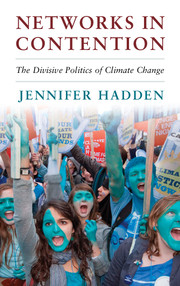This is a guest post from Jennifer Hadden, an Assistant Professor at the University of Maryland’s Department of Government and Politics. I had the pleasure of editing a reviews exchange on her new book, Networks in Contention. The exchange just came out in the latest issue of International Politics Reviews and features reviews from me (Josh), Thomas Hale, and Johannes Urpelainen, as well as a response from Hadden herself. Ungated access here.
World leaders adopted a global agreement on climate change in Paris last month, as was widely reported. Less well know is that in parallel to the inter-state negotiations, the Paris conference included a high-level “Action Agenda” to recognize the commitments of non-state actors to reducing greenhouse gas emissions. The Action Agenda raised the profile of non-state actors within the UNFCCC, highlighting the critical role of cities, regions, businesses, faith groups, and NGOs in raising ambition, building knowledge, and supporting implementation.
The warm reception for non-state actors in Paris differs dramatically from the highly contentious environment of the Copenhagen climate summit, which I describe in my recent book Networks in Contention: The Divisive Politics of Climate Change. How has the role of non-state actors in climate governance evolved from Copenhagen to Paris?
 This week, International Politics Review published a review forum (ungated) amongst Josh Busby, Johannes Urpelainen, Tom Hale, and myself on this topic. In our exchange we use my book as a springboard to discuss recent developments in this area. Some main themes we discuss include:
This week, International Politics Review published a review forum (ungated) amongst Josh Busby, Johannes Urpelainen, Tom Hale, and myself on this topic. In our exchange we use my book as a springboard to discuss recent developments in this area. Some main themes we discuss include:
- Why do we see increased participation of non-state actors in climate politics? Last year I wrote about how the climate movement has diversified post-Copenhagen, as was clearly demonstrated at the massive People’s Climate March. A plethora of other non-state actors – especially cities and businesses – have also become more deeply engaged in the climate agenda since Copenhagen, as Bulkeley and co-authors document in their recent Transnational Climate Change Governance In our forum, Hale discusses the emergence of a “positive agenda” around the UNFCCC post-Copenhagen that broadened participation and may put critics at a disadvantage.
- What roles do NGOs play in global climate politics? The traditional roles of NGOs – lobbying and protest – were in evidence in Paris. But the Paris conference also demonstrated that non-state actors can adopt their own commitments to reduce emissions, contributing directly to problem-solving in this area. Examining the determinants of their choices will be an interesting area for future research. Further, it will be interesting to observe if NGOs might play the role of informal monitors of the Paris agreement, adding additional accountability to the new “bottom-up” system of climate governance.
- What influence do NGOs have on global climate governance? Our review forum identifies two particular challenges for researchers working in this area. First, there are many potential dependent variables that we may expect NGOs to influence. In my book I focus on outcomes within the UNFCCC, an area where both Busby and Urpelainen express skepticism. The nationally determined structure of the Paris process illustrates why future scholarship should pay more attention to the influence of climate NGOs on national policy. The centrality of the Action Agenda illustrates why examining the influence of climate NGOs on cities, businesses, and educational institutions is also critical. Second, my book establishes that NGOs adopt different – and sometimes conflicting – strategies in global climate politics. Accounting for growing complexity in the field of non-state actors is an important research objective; it’s also a major challenge for the future of effective governance of this issue area.
The Review Forum is available ungated from International Politics Review here.
Joshua Busby is a Professor in the LBJ School of Public Affairs at the University of Texas-Austin. From 2021-2023, he served as a Senior Advisor for Climate at the U.S. Department of Defense. His most recent book is States and Nature: The Effects of Climate Change on Security (Cambridge, 2023). He is also the author of Moral Movements and Foreign Policy (Cambridge, 2010) and the co-author, with Ethan Kapstein, of AIDS Drugs for All: Social Movements and Market Transformations (Cambridge, 2013). His main research interests include transnational advocacy and social movements, international security and climate change, global public health and HIV/ AIDS, energy and environmental policy, and U.S. foreign policy.


0 Comments